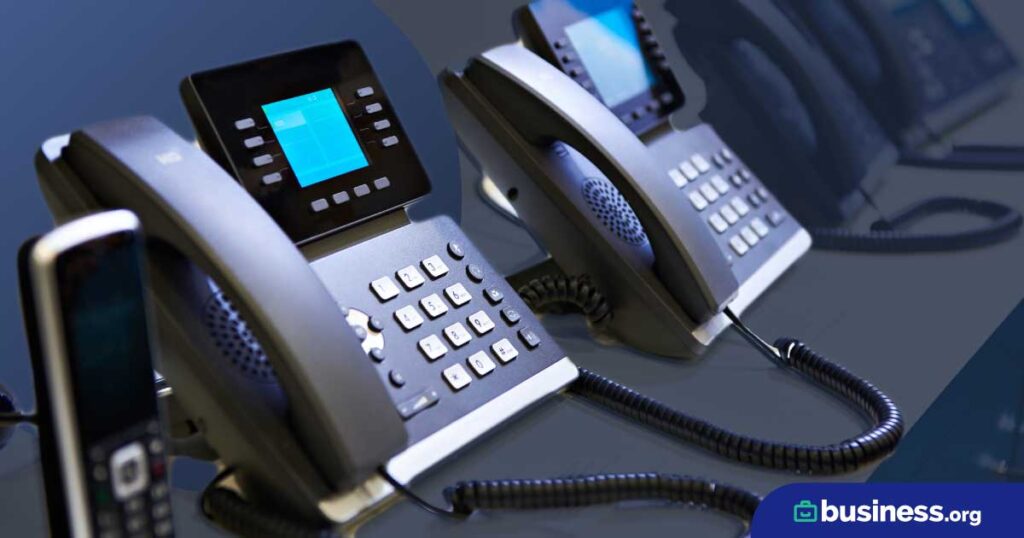We are committed to sharing unbiased reviews. Some of the links on our site are from our partners who compensate us. Read our editorial guidelines and advertising disclosure.
How to Set Up a Phone System for Your Small Business
There is a range of business phone systems on the market which offer features for individual entrepreneurs, small businesses, and larger offices. There are a number of factors to consider when choosing a business phone system for your company. Here are our recommendations of what to prioritize and which options out there deserve a closer look.
Key Considerations
Consider your location and whether you work virtually or in an office. Also consider your budget, how many employees you have, how they will be utilizing the system, plans for future growth of your company, and which services are available in your area. Once you figure out your needs, you can narrow down your options for business phone systems.
For a full-service business phone solution that also provides reliable services for your growing business, RingCentral is a great option.
Deciding Which Phone Technology to Use
Key KSU-Less Systems
This system is ideal for small businesses that have 10 or fewer employees. KSU-less phone systems offer advanced features, such as call transferring, conference calls, and multiple extensions without the additional cost that comes along with setup of a central control box (or KSU). The main drawback of KSU-less phones is that the maintenance falls to the customer. These systems are inexpensive and aren't supported by most major telephone vendors. If you have trouble with your phone service, it can be a challenge to get the support you need. However, if you know phone systems, you should be able to get along fine.
KSU Systems
Key systems offer multiple phone lines that are supported by a central control unit, or key system unit (KSU). KSUs are great for small to medium sized businesses that employ between five and 75 people. These systems are more expensive than the KSU-less phones because they typically include costs for installation and maintenance. KSUs are supported by major telecom vendors and offer the flexibility of expansion if your business grows.
By signing up I agree to the Terms of Use and Privacy Policy.
PBX Systems
Private branch exchanges (PBX) are most often utilized by larger businesses that employ more than 75 people. PBX systems offer highly advanced features and flexibility but often come with a high upfront cost for business phone setup and installation. While you may save money with these advanced features in the long term, PBX systems are generally recommended for medium to large businesses that have a variety of complex needs for their business phone system.
VoIP Systems
Voice over Internet Protocol (VoIP) allows businesses to utilize the Internet to make calls domestically or internationally. While VoIP is convenient in terms of connectivity, you should generally opt for a hosted VoIP system to help deal with any problems that may arise. While you can manage the equipment yourself through a traditional system, you may run into issues if you are not especially tech-savvy. Hosted VoIP systems generally require you pay a monthly fee to a telecom company for use of their equipment and support, but the expense is worth it if you can afford it and if it meets your needs.
Compare the best VoIP providers
Data as of 11/22/22. Offers and availability may vary by location and are subject to change.
*With annual billing
**With contract
The takeaway
You have many options for business phone systems based on your budget, needs, and number of employees. Once you've determined which system is a good fit for your business, contact your local telecom provider to discuss cost, installation, and maintenance.
Related reading
Business phone setup FAQ
That will depend on the type of system you're looking for, whether that's traditional, virtual, or VoIP. For VoIP systems, we recommend RingCentral for its affordability and wide feature range and Ooma for its scalability and ease of use. For the other types of systems, we review and recommend a long list in our Best Small-Business Phone Systems.
Depending upon the phone technology, expenses will vary, with KSU-Less systems being the least expensive due to the lack of a central control box, and no added costs for maintenance and installation. KSU Systems are more expensive due to these added features, typically costing around $250 (including installation). PBX is the most expensive, starting at around $1,000 per employee. VoIP systems are known to be inexpensive, and our favorites average $15 to $20 a month per user.
Disclaimer
At Business.org, our research is meant to offer general product and service recommendations. We don't guarantee that our suggestions will work best for each individual or business, so consider your unique needs when choosing products and services.






